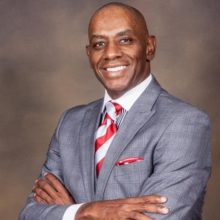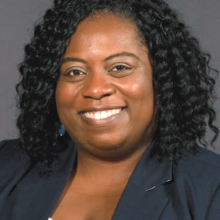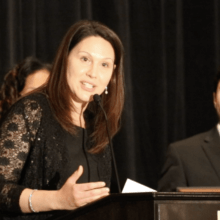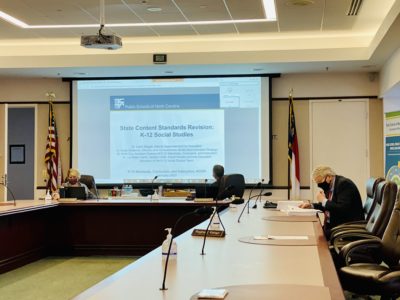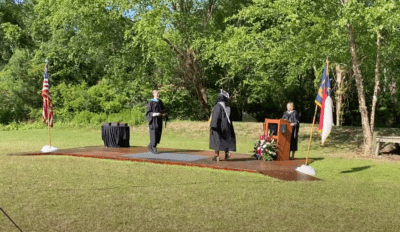
As the State Board’s team of teachers, principals, and the Superintendent of the Year, we are writing this open letter to express our collective support for the current iteration of North Carolina’s social studies standards. We believe these standards are ready for installation along with an emerging set of unpacking tools under development from the NC Department of Public Instruction (DPI). We wanted to take this opportunity to offer our perspective on three specific concerns expressed during the January Board meeting.
American histories
We believe the proposed standards reflect our nation’s historical complexity and context. They reflect the ideals upon which our country was founded as well as the prevailing paradoxes and multiple perspectives inherent in the history and culture of our country. To ground our teaching of American history in facts, and to serve the best interests of our students, we must teach standards that address the hard truths of America.
As a basic example, how can we honestly teach the aspirational tenets of America, such as “All men are created equal,” without also acknowledging that historical injustices permeate American history? Yet the previous iteration of standards only “encouraged” teachers to address slavery and indigenous populations, and the words “injustice,” “segregation,” “discrimination,” and “racism” were altogether missing from the previous draft. It is also critical that the standards we teach more specifically address the impact of the American experiment upon indigenous populations.
The proposed standards now have the specificity of language and breadth of scope that previous iterations were missing, which will allow further granularity in the implementation materials provided by DPI and in the curricula that school districts will ultimately select for their scholars. And the Board’s commitment to providing a sound basic education for each and every scholar can only be achieved when their own identities, histories, and lived experiences are reflected in the standards they learn in school.
Inquiry standards
A concern was expressed about the inquiry standards and how they relate specifically to history. We are excited about the inclusion of these inquiry standards because they will enable every teacher to differentiate the learning experiences of their scholars and to empower their scholars to deepen their learning in areas of personal interest.
Similar to the College, Career, and Civic Life (C3) Framework, the inquiry standards will promote critical thinking, rigor, and enduring understandings from our history scholars as well as instructional shifts that make course content more relevant. Just like science education, we believe inquiry is also at the heart of great social studies education. These inquiry standards will develop a sense of agency in our scholars by challenging them to develop compelling questions, to find and evaluate primary and secondary sources to inform their inquiry-centered learning, and to drive their own historical learning through “rigorous academic discussions emphasizing multiple viewpoints in which claims and evidence are acknowledged, critiqued, and built upon in order to create new understandings of complex historical or current issues” (Standard I.1.5).
In our professional opinions, the grades 9-12 history inquiry standards, as written, will put our scholars squarely in the driver’s seat of their own learning and build their muscle as engaged citizens and members of our democratic society.
Gender identity
A concern was expressed about the use of the term “gender identity” in the history standards. While binary “gender” is commonly identified by anatomy at birth as male or female, “gender identity” is not determined by physiology.
According to the World Health Organization, gender identity “refers to a person’s deeply felt, internal and individual experience of gender, which may or may not correspond to the person’s physiology or designated sex at birth.” It’s critical to recognize that every individual has a gender identity. During the PK-12 years, every young person comes to a deeper understanding of their own gender identity, makes choices about how they express their gender through clothing, behavior, and appearance, and must negotiate their relationship to prevalent gender norms and expectations.
This is easier for some students than others. The World Health Organization cautions that “rigid gender norms negatively affect people with diverse gender identities, who often face violence, stigma and discrimination as a result,” citing higher risk of mental health problems and suicide. In 2019, the WHO removed the designation of “gender identity disorder,” recognizing that gender dysphoria stems not from individual psychology but from the trauma of being forced to comply with rigid gender norms.
Note that the specific history standards that include the term “gender identity” relate to “access to democratic rights and freedoms,” (CL.H.1.3), “access to justice” (CL.C&G.4.6) and “evolution of individual rights in America over time” (CL.H.1.3), which seem precisely relevant to contemporary understanding of gender identity.
Finally, we ask that you recognize that this standard is not only relevant to transgender students, but to every student’s full understanding of history: it is impossible to comprehend the historical significance of figures like Sacagawea, Harriet Tubman, Joan of Arc, Amelia Earhart, or the suffragists, to name only a few, without considering how they negotiated the gender rules and expectations of their time. It would be our prayer that our State Board of Education would take the lead of the World Health Organization, as well as the United Nations Human Rights Council, by acknowledging the existence of gender identity as it relates to the students we teach and the specific history standards cited above.
Empowering citizenship
In closing, history education is about more than just learning what happened in our past. A great history education empowers scholars to think critically about how the past informs the present. It helps scholars embrace their roles as not only witnesses to history but architects of their own lives. It serves the public good by teaching us about each other, and it places a premium on developing our skills to navigate the world we share.
We need look no further than the recent insurrection in Washington D.C. to see the imperative we have in North Carolina to develop social studies standards that bring clarity about the past and empower our next generation of citizens to understand the inherent strength in a diverse society.
We believe State Board Chair Eric Davis captured the importance of the history standards when he said: “They’re our shared history, and yet we don’t share the same history … and therein lies the opportunity before us to help our students understand and appreciate the differences and the similarities.”
Editor’s note: Anthony Jackson and Mariah Morris serve on EducationNC’s Board.

